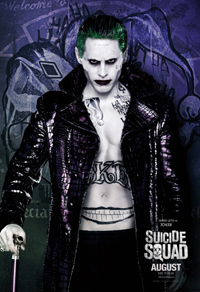Monsters, Inc.: Ayer’s DC Comic Mashup is All Bark and No Bite
 Try as he might, director David Ayer’s valiant efforts to counter the onslaught of repetitive super hero comic book tropes with his nihilist flavored Suicide Squad are all in vain, sagging underneath too many expectations and evident constraints, starting with (but not completely to be blamed) on the film’s PG-13 rating. Like a Frank Miller stab at copycatting The Avengers, a slew of super villains are forced into combat for the service of the good guys, an idea which has certain potential but is executed so illogically and inanely the whole can never rise above the refreshing madness of some of its parts. With too many loosely defined characters to juggle and a tonally awkward shift between what appears to be Tim Burton inspired Goth noir and evil cartoon campiness, this is ultimately the weakest ensemble outing from a director with a knack for hard edged grittiness and grim blue collar underdog factions.
Try as he might, director David Ayer’s valiant efforts to counter the onslaught of repetitive super hero comic book tropes with his nihilist flavored Suicide Squad are all in vain, sagging underneath too many expectations and evident constraints, starting with (but not completely to be blamed) on the film’s PG-13 rating. Like a Frank Miller stab at copycatting The Avengers, a slew of super villains are forced into combat for the service of the good guys, an idea which has certain potential but is executed so illogically and inanely the whole can never rise above the refreshing madness of some of its parts. With too many loosely defined characters to juggle and a tonally awkward shift between what appears to be Tim Burton inspired Goth noir and evil cartoon campiness, this is ultimately the weakest ensemble outing from a director with a knack for hard edged grittiness and grim blue collar underdog factions.
Amanda Waller (Viola Davis) is a top official at a secret government agency charged with developing protections against the nation’s greatest fears following the demise of Superman—what if the next unconquerable super hero doesn’t share our human values? Amassing a cadre of meta-human criminals, Waller has locked away some incredibly notorious personalities, including hit man Deadshot (Will Smith), and insane Harley Quinn (Margot Robbie), the deadly girlfriend of The Joker (Jared Leto). Since each of them has a weak spot, Waller finds a way to hold each of them accountable to her. Just as the her covert op is unveiled, an ancient being is unleashed in the Mid-City subway, and the self-professed Suicide Squad is dispatched to conquer it…or die.
Ayer has a knack for the grisly and the macabre, having written Training Day (2002) and then eventually directing his own reality-based scenarios usually involving a wide variety of strong characterizations, whether in the vein of a somber war film (Fury), heist thriller (Sabotage) or buddy cop drama (End of Watch). A fine sense for gritty, apathetic realities, Ayer speckles these scenarios with instances of shocking dread or peripheral grotesqueries. But Suicide Squad doesn’t seem to know whether to hit the gas or hit the brakes and often seems to forget the thrust of its own narrative.
Initially, during its chewy yet promising set-up, wherein Viola Davis explains it all for us as she masticates a juicy steak while relaying heavy exposition, it seems we are in set for some sort of dark-hearted saga eager to topple Deadpool’s new adult flavored standard. Yet sequences featuring intense shoot-outs quickly become flaccid, routine, and uneventful once it’s established characters are battling another powerful demigod suddenly awakened and determined to wipe out modernized man (not unlike a similar scenario in the last X-Men flick). And much like the poo-poo platter of crime fighters in The Avengers, there’s an imbalance of power and capability amongst them.
Most of these characters are low-hanging fruit, obviously disposable for whatever the narrative demands (including Jai Courtney’s Boomerang, Adam Beach’s Slipknot, and several others). Abdewale Akinnuoye-Agbaje’s Killer Croc seems a waste of great make-up, while Jared Leto’s peripheral Joker bleeds his screen time with over-the-top intensity for a character who never feels justifiable, a harsh streak of comic relief trotted out whenever the action wanes. Others, like Kinnaman and Davis, are so monotonously straight faced and forced to utter several bits of atrociously inane dialogue. Jay Hernandez as Diablo has an ill-explained secret which pops up at the very last minute.
Will Smith’s Deadshot is apparently the world’s most skilled hit man—and yet, aren’t there robots capable of executing his lone skill? At the same time, Smith tends to extend himself a bit here, competing with the shameless scene-stealer, Margot Robbie, whose Harley Quinn is more interesting and more deserving of screen time than all the rest of these characters put together. A dramatic swan dive into some unexplained melting pot of chemicals a la Who Framed Roger Rabbit? to profess her love for the Joker is one of several notable moments where she’s a perverted exaggeration of blonde feminine evil, comparable to Michelle Pfeiffer’s iconic iteration of Cat Woman. And on the other end of this spectrum is the film’s major weak spot, Cara Delevingne, as anthropologist turned ancient Enchantress, gyrating ludicrously and eventually voiced by another woman altogether.
Submerged in its own mythos, Suicide Squad stomps noisily through a self-referential kingdom, but all these extraneous details eventually feel for nought. Ayer seems so obsessed by certain details he wasn’t able (or allowed) to give his pack of vipers something to do once he bonded them together.
★★/☆☆☆☆☆


